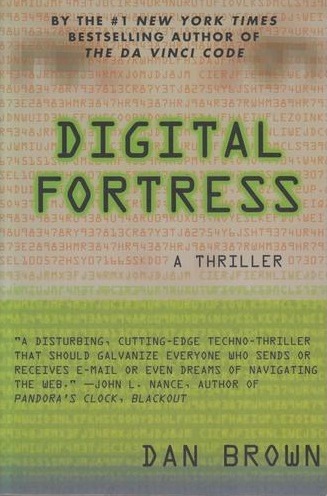Digital Fortress, Dan Brown
 Digital Fortress is a novel from Dan Brown, before he was a bestseller,
which is to say before the work that made him a household name, Da Vinci
Code. Perhaps this is just the kind of novel that can be used to raise
awareness of a field and to attract young people into it, thought I as I held
the book in the airport bookstore. As my flight out was several hours away,
it seemed like an ideal opportunity to find out.
Digital Fortress is a novel from Dan Brown, before he was a bestseller,
which is to say before the work that made him a household name, Da Vinci
Code. Perhaps this is just the kind of novel that can be used to raise
awareness of a field and to attract young people into it, thought I as I held
the book in the airport bookstore. As my flight out was several hours away,
it seemed like an ideal opportunity to find out.
The brilliant and beautiful cryptographer Susan Fletcher is brought in to handle a cryptographic problem that the codebreaking system employed by the U.S. National Security Agency (NSA) cannot crack in a few minutes or hours. Her fiancé David Becker, a brilliant and dashing linguist, is sent by Fletcher’s boss to Europe in search of something needed to address the same cryptographic problem. As everyone knows, NSA sends people out on field missions, especially if those people are university professors whose expertise is language. This is just where one needs to begin the suspension of disbelief for the sake of making it through the novel.
Brown clearly had some exposure to cryptography. He credits two anonymous sources who identified themselves as former NSA people. Either they weren’t former NSA cryppies or Brown didn't spend much time with them. The problems with the cryptography are simply too numerous even to address. NSA's codebreaker TRANSLTR is absurdly implausible.
I confess to feeling a slight bit of annoyance with the reference to EFF and their DES cracker, without any reference to the earlier effort DESCHALL that was actually the first to break a message encrypted with the then-sitting U.S. Government standard for data encryption.
Brown also had some exposure to computer viruses. Alas, the virus notion is pretty wild. While there are some interesting ideas about how to get malware in to hit a particular target, the way that the virus strike plays itself out in the novel is also just too far removed from plausibility to be entertained seriously.
The story itself also is just too obvious. An astute reader wonders why this is any more than a short story. Clichés abound; in many cases one need only scan for the next to be able to piece together the story and to keep up with the material.
I do like to see cryptography presented as interesting, and part of something important. To do so in a form that is accessible to an audience with no technical background is also interesting. To do so in a way that is also plausible, that would actually work for the most part is the real art. It is in that art that Digital Fortress ultimately fails.
Thus I continue in my search for the kind of text to which I can refer students who might be helped by a bit of fiction to take an interest in an important field—one where we have an urgent need for new professionals. I shall report on Tetraktys by Ari Juels, an actual cryptographer, in the future.

